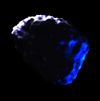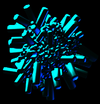(fixed the broken table and did an in-theme rewrite) |
(added images of the ore chunks) |
||
| (3 intermediate revisions by 2 users not shown) | |||
| Line 1: | Line 1: | ||
'Chunks' are the colloquial name for the nuggets of mineral-rich ore that form in the cores of [[Ringroid|ringroids]]. They are so common that many spacecraft operating within the rings are exclusively designed with their spherical forms in mind. | 'Chunks' are the colloquial name for the nuggets of [[Minerals|mineral]]-rich ore that form in the cores of [[Ringroid|ringroids]]. They are so common that many spacecraft operating within the rings are exclusively designed with their spherical forms in mind. | ||
The [[asteroid impact of 2184]] with the then-in-construction [[Enceladus Prime]] revealed anomalous mineral concentrations within the [[A Ring]], the primary elements of which are listed below. Note that all ore chunks contain a significant amount of ice, and that their average mass and purity increase as one goes deeper into the rings. | The [[asteroid impact of 2184]] with the then-in-construction [[Enceladus Prime]] revealed anomalous mineral concentrations within the [[A Ring]], the primary elements of which are listed below. Note that all ore chunks contain a significant amount of ice, and that their average mass and purity increase as one goes deeper into the rings. | ||
The following graph provides general information on the minerals, including frequency, average chunk masses that you'd expect, the average impurities of the ore chunks (how much mineral per total mass), the average cost in metric tonnes, and a visual to reference what each ore chunk looks like: | |||
{| class="wikitable" | {| class="wikitable" | ||
|+ | |+ | ||
| Line 7: | Line 9: | ||
!Frequency | !Frequency | ||
!Average chunk mass | !Average chunk mass | ||
!Average chunk purity | |||
!Average price | !Average price | ||
per metric | per metric tonne | ||
!Chunk | |||
|- | |- | ||
|Iron (Fe) | |Iron (Fe) | ||
|Very common | |Very common | ||
| | |7,500 kg | ||
|60% | |||
|900 E$ | |900 E$ | ||
|[[File:Iron chunk.png|100x100px]] | |||
|- | |- | ||
|Palladium (Pd) | |Palladium (Pd) | ||
|Common | |Common | ||
|4,000 kg | |4,000 kg | ||
|52% | |||
|2,500 E$ | |2,500 E$ | ||
|[[File:Palladium chunk.png|100x100px]] | |||
|- | |- | ||
|Platinum (Pt) | |Platinum (Pt) | ||
|Common | |Common | ||
|4,000 kg | |4,000 kg | ||
|76% | |||
|2,700 E$ | |2,700 E$ | ||
|[[File:Platinum chunk.png|101x101px]] | |||
|- | |- | ||
|Vanadium (V) | |Vanadium (V) | ||
|Common | |Common | ||
| | |3,000 kg | ||
|82% | |||
|3,000 E$ | |3,000 E$ | ||
|[[File:Vanadium chunk.png|100x100px]] | |||
|- | |- | ||
|Tungsten (W) | |Tungsten (W) | ||
|Infrequent | |Infrequent | ||
|3,000 kg | |3,000 kg | ||
|50% | |||
|6,500 E$ | |6,500 E$ | ||
|[[File:Tungsten chunk.png|100x100px]] | |||
|- | |- | ||
|Beryllium (Be) | |Beryllium (Be) | ||
|Rare | |Rare | ||
|1,000 kg | |1,000 kg | ||
|20, | |76% | ||
|20,500 E$ | |||
|[[File:Beryllium chunk.png|104x104px]] | |||
|} | |} | ||
[[Category:Codex]] | [[Category:Codex]] | ||
Latest revision as of 05:12, 16 September 2024
'Chunks' are the colloquial name for the nuggets of mineral-rich ore that form in the cores of ringroids. They are so common that many spacecraft operating within the rings are exclusively designed with their spherical forms in mind.
The asteroid impact of 2184 with the then-in-construction Enceladus Prime revealed anomalous mineral concentrations within the A Ring, the primary elements of which are listed below. Note that all ore chunks contain a significant amount of ice, and that their average mass and purity increase as one goes deeper into the rings.
The following graph provides general information on the minerals, including frequency, average chunk masses that you'd expect, the average impurities of the ore chunks (how much mineral per total mass), the average cost in metric tonnes, and a visual to reference what each ore chunk looks like:





